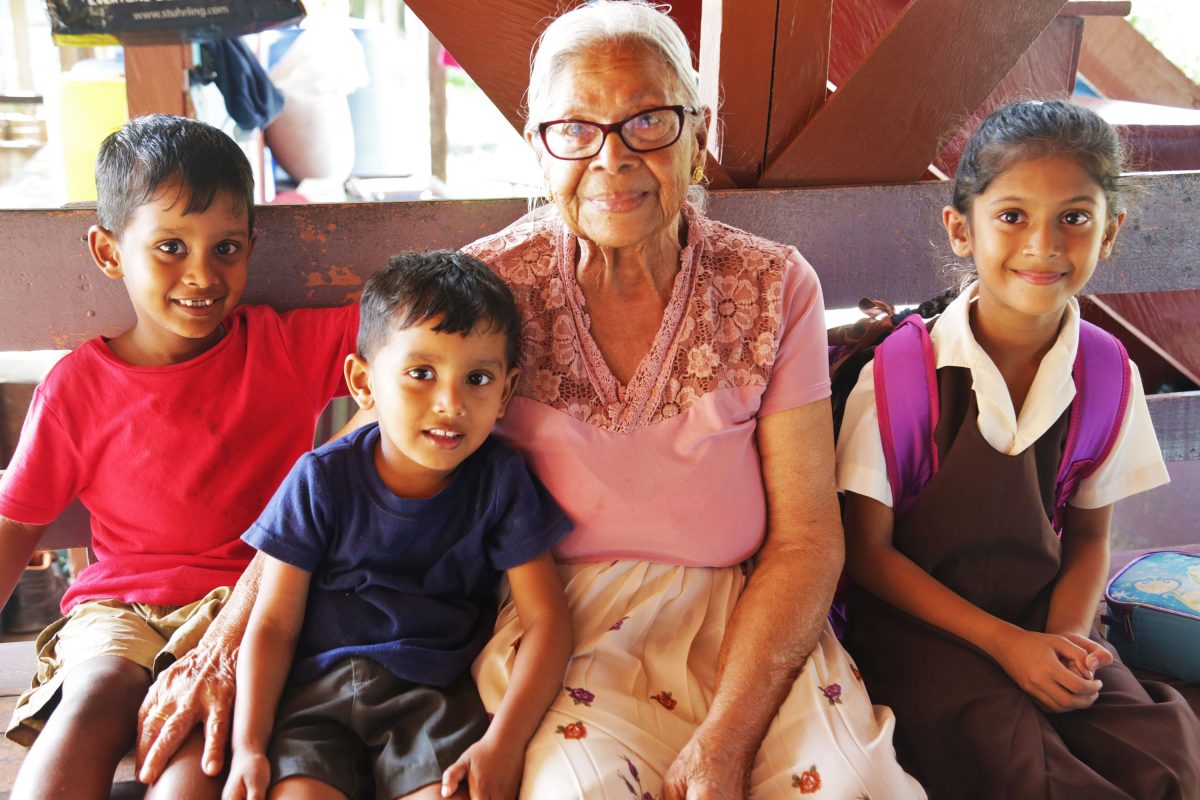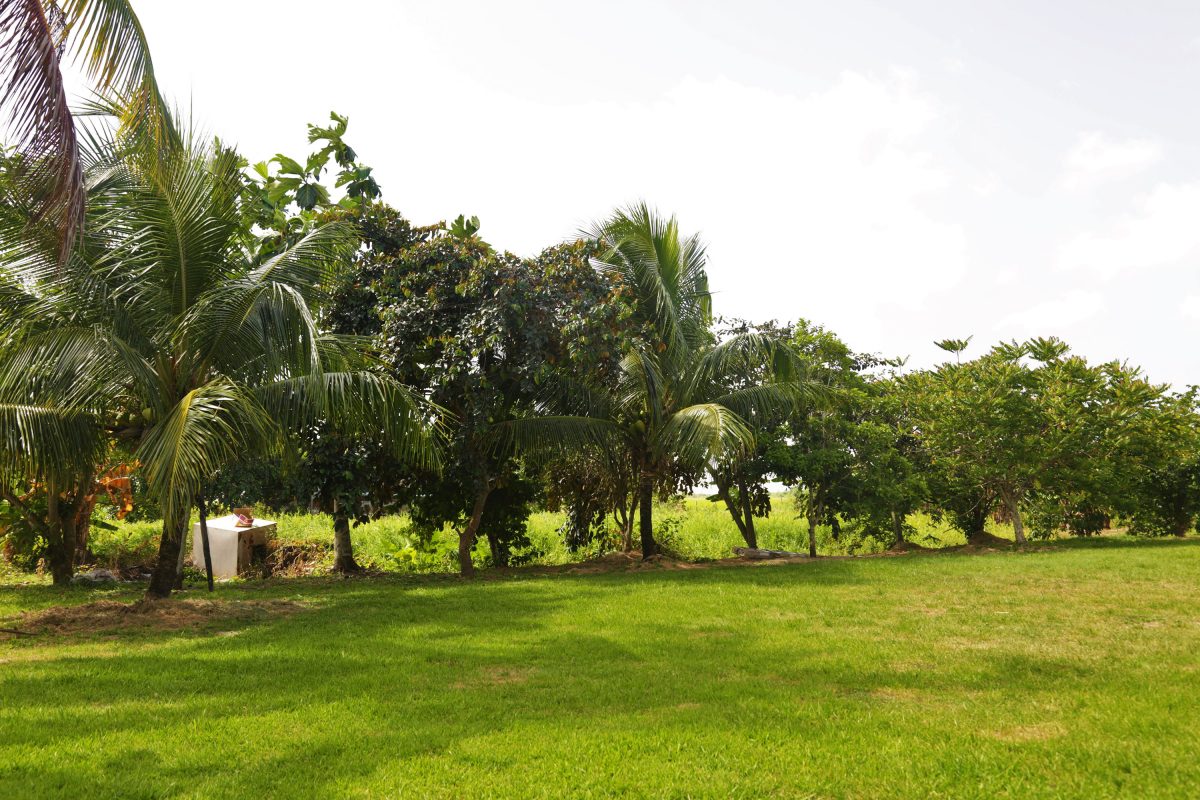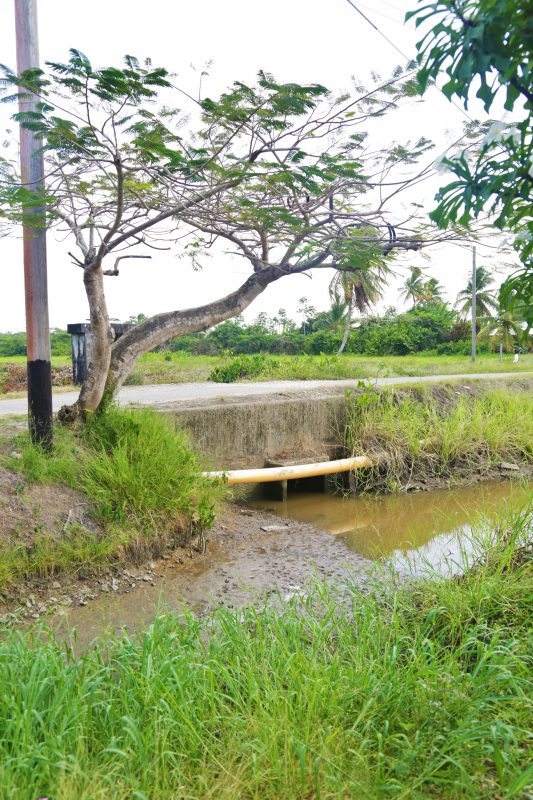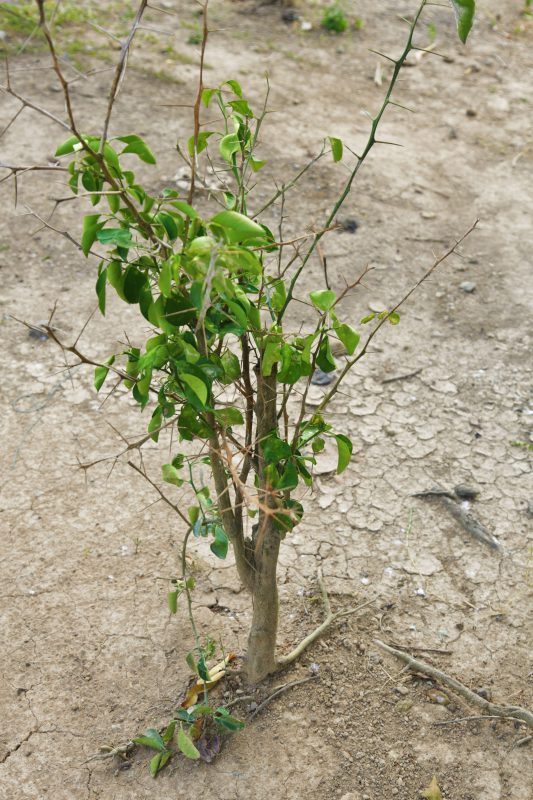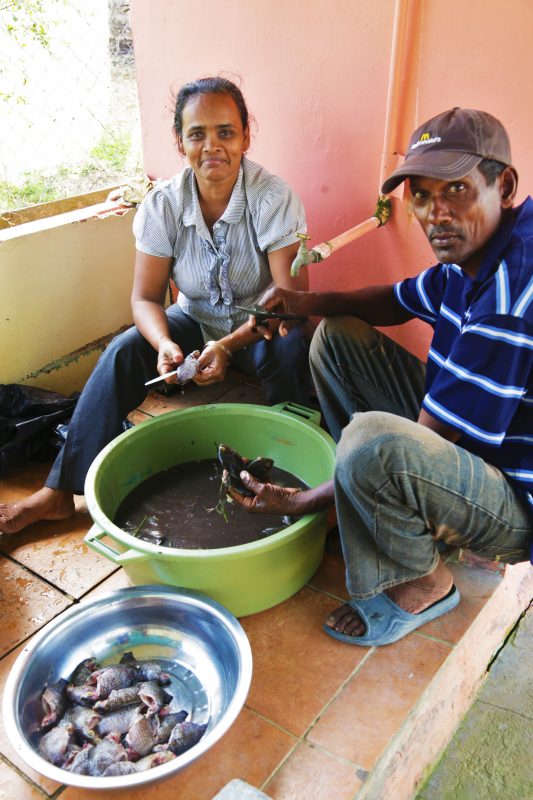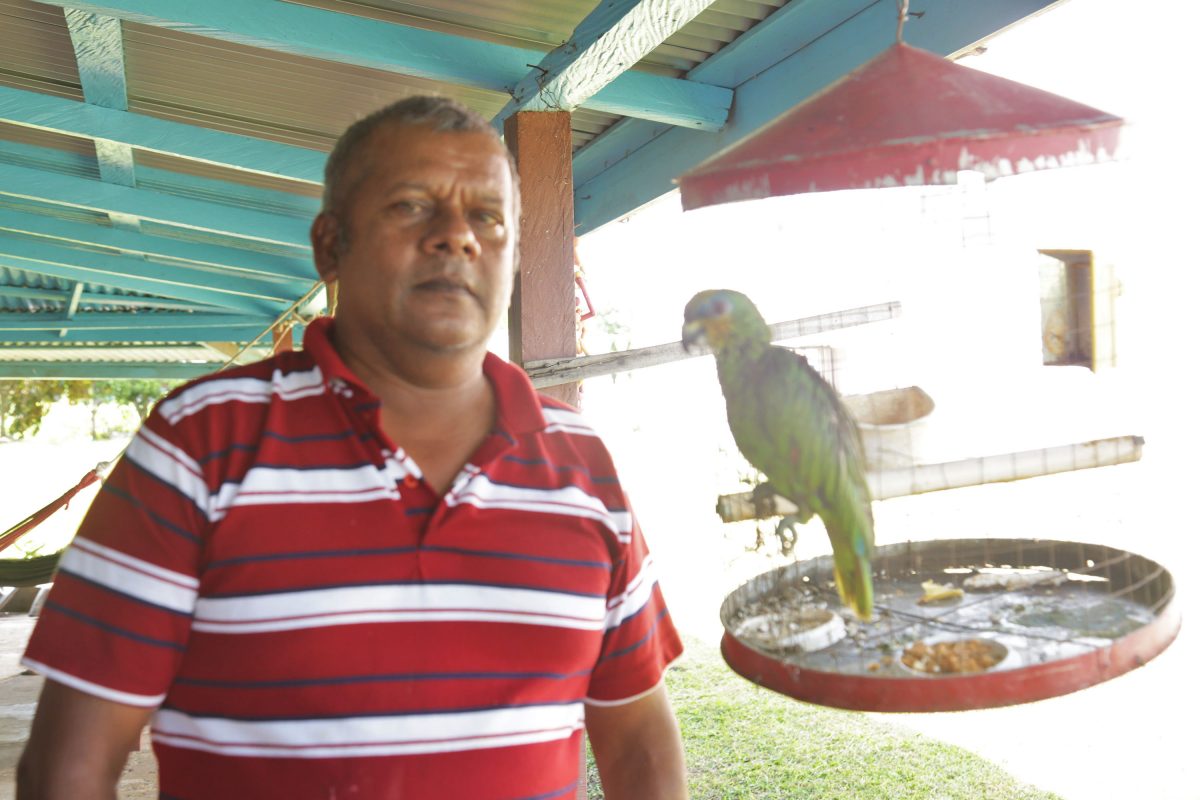Mortice, Mahaicony, East Coast Demerara is not visible from the Mahaicony main road. To get there, one must take the Mahaicony Old Road, stop at the Mahaicony Market and get a bus or car into the Mahaicony Branch Road. This bus or car ride costs $200 a person, but one could wait 30 minutes to an hour for the vehicle to fill. As a result, most of the residents get taxis at the market at the cost of $1,000 or $1,500.
The ride along the road is a tranquil one, taking you past rice fields, houses with fine architecture and some desolate parts where the trees mirror each other on the sides of the road. After one passes through almost a dozen tiny communities, one arrives at Mortice, which is bordered by New Providence and Wash Clothes.
The more than 100 residents of the village consider themselves family. When they are not hard at work at rice farming or cattle rearing, which is the primary economic activity of the village, they spend time with each other.
When I encountered them, Kavi Itwaru sat in one hammock and her daughter and grandson in another. The sun was hot, but they were in the shade under the house, where they were also benefitting from abundant breeze.
Born and raised in Wash Clothes, Itwaru got married in 1973 and then settled in Mortice. “Back in those days we had an artesian well where we used to pump the water up but now we’re getting better,” the woman said referring to potable water.
Asked about the name of the village, she was not sure how it came about, but said according to rumours she heard, it was named after one of the earliest residents. The families she remembers living in Mortice in the early years were the Moosais, the Josephs, the Tarchands, the Charrans, the Balkarrans and the Mulchans. The people of Mortice, she said, have always been friendly and cooperative and time has not changed that.
Itwaru shared that when she was a girl, the village was already in existence and what has changed is the population, which has declined over the years due to migration.
Pupils attending the Mortice Primary and Nursery schools come from surrounding villages, including communities situated across the Mahaicony River, opposite Branch Road.
Once a week a grocery van traverses the village but Itwaru and her family prefer to shop at the market. Though she gets greens from the market, the woman also plants a kitchen garden. She pointed out many of her shriveled plants in the hardened, cracked ground that succumbed during the current dry spell. In one part, where there were huge cracks in the ground, they had caught a labaria crawling earlier in the day; the snake lay dead several feet away. The drought, she noted, had also affected the volume of the water in the drain in her part of the community. And to make matters worse, she added, the drains and canals had not been cleaned in the last five years. In another part of the drain, where there was a substantial amount of water, her ducks enjoyed bathing and diving.
Her daughter explained that of the two species of ducks they reared, the ‘wisi wisi’ were only found in Region Five. They are known to be good divers and because they are rare in other parts of Guyana, they are sold at a higher cost than the common ducks. Itwaru’s daughter noted that she has to take special care to see that the wings are kept short, as they can fly away.
Speaking about development in her community, the woman’s daughter said not much has been done. In fact, she claimed that only a portion of the branch road was redone. The same section recently had streetlights installed.
Two main developments in the area Itwaru would like to see are the fixing of the road and better irrigation. The road, she noted, is so narrow that when trucks are passing through Mortice on their way to the rice mill in Esau and Jacob, other vehicles have to stop.
It seems that in Mortice resting in a hammock and chatting is the norm. Imraj Baldeo sat in a hammock opposite his wife, who was also in a hammock. Outside at the pipe in the backyard their friends, a couple called the Mahadeos, sat cleaning fresh patwas caught in the Mahaicony River with fishing rods. Though not related, Baldeo referred to the pair as his family.
Mortice, the man said, is made up mainly of people who are self-employed. He is a rice farmer and has been farming for more than 20 years. He and his wife hail from the Mahaicony Creek, a community called Pine Ground. They moved to Mortice to provide their children with a secondary education.
Asked what he likes about living in Mortice, the man asked me to listen. “Listen…you can only hear like the birds, or only if the machinery start up to go to the backdam. Here is very quiet and peaceful. If you looking for relaxation, you come this part of Mahaicony,” he said.
When residents here are not at work or home or visiting a neighbour, they also visit their respective places of worship. Baldeo and his family are Hindus and attend the mandir a stone’s throw away from their house. Mortice also has a church. However, the nearest mosque is situated outside of the Branch Road in Central Mahaicony.
Speaking about transportation, Baldeo said that if one is not on the road between 7 am and 9.30 am or between 2 pm and 4.30 pm to catch the buses, one would likely have to get a taxi.
Asked about issues faced by the village, the resident shared that when crop is out, there is not much to do, especially for the youths. An industry in Mortice, he said, or even along another part of Branch Road would benefit them. If the residents, he said, can look forward to work they can do daily, then they can work towards developing themselves and doing more for their children. All the people of Mortice want is to be afforded the same opportunities as those living in the city.
In his part of Mortice, Baldeo said, he does not have an issue with irrigation though he confirmed that indeed Itwaru’s part of the village has been adversely affected in this area. What concerns him, he said, is the road not being upgraded like the first part of Branch Road. He claimed it was only done because most of the people are supporters of the current administration. The man further said that residents of various villages have for years made representation for the entire road to be fixed.
Currently he sells his paddy to the rice mill in Esau and Jacob or at another village before Mortice. Paddy, he said, is sold at $3,100 a bag but the price is too measly. While he is being paid better than other farmers around Guyana, Baldeo posited that to be able to be paid $3,100 a bag he had to invest in more fertiliser and all that was needed for his crop in order to produce paddy rated within the A-C grade.
While he loves it at Mortice, Baldeo misses Pine Ground; he pointed out that the village was more peaceful and neighbours lived farther apart. He said he does not regret moving to Mortice, as it was solely in the best interest of his children. He indicated that he intends to retire at Pine Ground someday. His wife disagreed as she has grown to love Mortice, but Baldeo plans on talking her into going back eventually.
Baldeo directed me to his oldest neighbour, Pohmatie Moosai, 83, who I later found catching up with a niece. The two women were sitting on a bench while two great grandsons of Mossai played nearby. Soon the boys had company as children from the nearby primary school were dismissed for the day and came to wait for their parents to pick them up at the house. One little boy ran up to the cheery elderly woman and gave her a kiss on the cheek before running away again.
At her age she still loves to travel, whether around her village or to Mahaicony Market, where she was earlier in the day.
Moosai was born in Supply, another village along Branch Road. When she was 16, she married one of the Moosais and moved to Mortice. Their union produced four children: a son who works as a doctor in Barbados, two daughters who live in the United States and another daughter who lives and operates a business in Georgetown. Sometimes when she feels in want of an adventure, Moosai hops on a plane to visit one of her children.
Moving to live in Mortice at first, she said, was not easy. She was still a teenager and for the first couple of years, she and her husband stayed with his family. “If they [her in-laws] say something you play like you nah hear. You keep it in yuh mind, you laugh am or you cry it or something by yourself,” she shared, laughing as she did so.
Her stay with her in-laws did not last very long as her husband ensured that the two had their own home. Her beloved husband passed on four years ago.
In the earlier days, she said, there was a grocery shop in the village. Many of the customers were from the surrounding villages and from villages in the Mahaicony Creek as well. In time, the shop closed. Today there are no shops in the area and persons have to leave the village when they need an item.
Given her frequent travelling, she has come to realise how more developed other communities are and wishes that Mortice too can be afforded the same opportunities for the children who are coming up.
